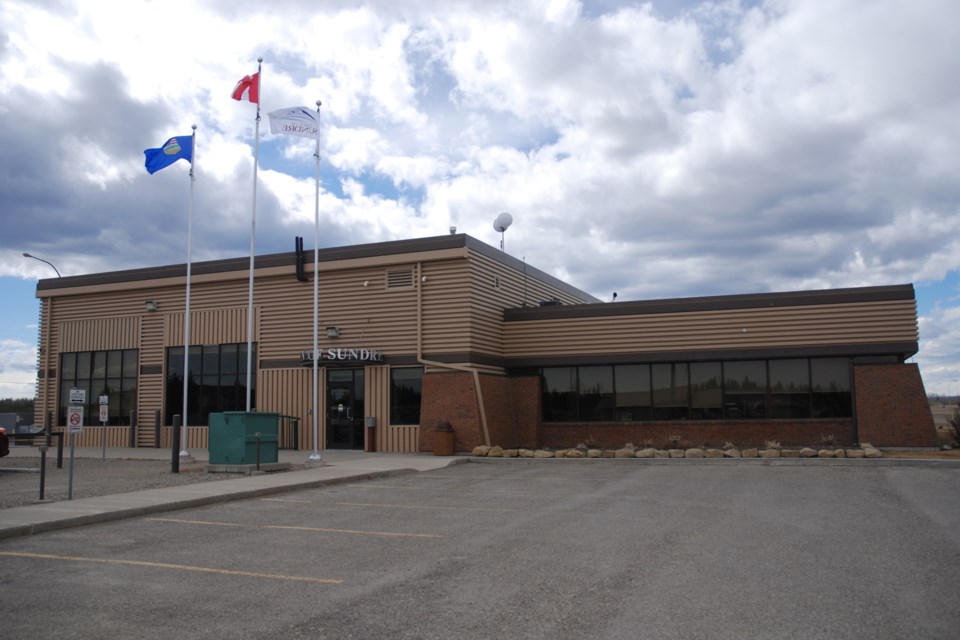SUNDRE – While the Town of Sundre has mostly managed to hold the line on its portion of tax collection, the provincial government’s much larger hike in its education requisition on residents will drive up the overall bill for most homeowners but businesses will largely be spared.
Chris Albert, director of corporate services, provided council during the regular April 7 meeting with a detailed breakdown comparing changes between 2024 and 2025 and how residential property owners and businesses will be impacted.
Offering background on how the tax rate bylaw is calculated, Albert said one aspect is the assessed value of both residential and non-residential, or business, properties.
Residentials assessments in 2025 went up to $360 million from $341 million in 2024, representing a $19 million increase.
“There are approximately 11 properties that went from vacant to a residential status,” he said. “So, we do have 11 properties that increased our assessments. But a portion of it is of course just inflation, market value changes, things like that.”
Business properties went up to a total valuation of $101 million from $94 million, or a $7 million increase, but their overall number did not change, he said.
The second aspect is the municipality’s budget, which council approved in December.
The total cash requirement in 2024 was nearly $4.4 million, which in 2025 has only slightly gone up to barely more than $4.4 million.
“The change from the total budget requirement was a 0.26 per cent increase to the amount that was required for operations,” he said.
Last year, the amount required from taxes was about $3.71 million, which this year nominally increased to almost $3.72 million. The difference between 2024 and 2025 in terms of amount collected in taxes is a $6,513 increase, or 0.18 per cent, he said.
The residential mill rate set by the town for the municipal portion of tax collection was actually reduced a bit to 7.2347 from 7.6529. The non-residential rate also dropped a little to 10.9607 from 11.5942. That represents the same ratio approved by council last year to slightly shift the tax burden toward commercial from residential.
“That was all the good news,” said Albert. “Now, I’ll get into some of the bad news.”
The education tax – a requisition that is set by the provincial government and collected by municipalities – had a substantial increase. That requisition for residential properties went up in 2025 to $949,140 from $837,834 last year. The more than $100,000 increase represents a 13.29 per cent hike, he said.
Non-residential properties were largely spared. The 2025 requisition for businesses is $384,838, up slightly from $370,402 in 2024 for a 3.9 per cent increase, he said.
That means under the education portion, the residential mill rate jumps to 2.6339 from 2.4535, while the business rate goes down to 3.8224 from 3.9367, he said.
The third and last portion the municipality collects is the requisition set by Mountain View Seniors’ Housing, which has a much more modest effect. The total amount to be collected in 2025 went up to $173,383 from last year’s $167,770, or a 3.35 per cent year-over-year increase. But due to the change in assessments, that rate despite the increase actually went down to 0.3761 from 0.3851, he said.
Offering a few examples of how sample residential properties stand to be impacted overall, Albert said a home with a valuation that increased to $265,000 from $250,000 will under the new rates see its municipal portion increase only $4 per year.
“Their total tax bill would actually go up $92 for the year,” he said.
The municipal portion of a property that increased in value to $473,000 from $457,000 would actually go down by $57 but the overall total tax bill still goes up by about $51, he said.
Looking at a couple of example commercial properties, he said a business that increased in value to $588,000 from $535,000 would see the municipal portion increase by $242 but that their overall tax bill would only go up $199 for the year, with the education and seniors’ portion offsetting the town’s increase.
Another business, which went up to nearly $1.3 million from $1.27 million, would see its municipal portion go down by $473 while their total tax bill drops $943, he said.
The examples are to highlight the challenge in attempting to assert in one broad generalization how taxpayers will be affected, he said.
Coun. Owen Petersen, who favoured approving the tax bylaw as presented, noted it seemed as though residential properties were going up while non-residentials decreased.
“Is that going to be a trend; would most non-residentials go down a bit, and most residentials go up a bit?” asked Petersen.
Albert said that would for the most part be correct.
“The biggest impact is because of the education portion of the bill,” he said.
“Because residentials increased by over 13 per cent, whereas the non-residential requirement only increased by over three per cent, that’s really the biggest impact,” he elaborated.
“That’s probably a fair statement across the board, is residentials are going up more percentage wise than non-residentials.”
Petersen said he was impressed with the four-year budget cycle through which the municipality, for its part, largely held the line without significantly increasing its portion charged to residents while still accomplishing major infrastructure upgrades.
Following a brief discussion, council unanimously carried all of the required readings to approve to tax bylaw.



